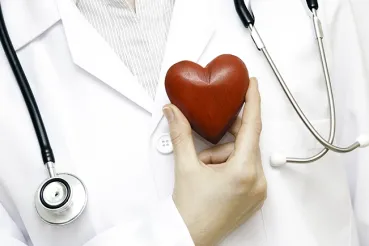Have you ever felt a sharp pain in your chest and were convinced you were having a heart attack? Maybe you even went to the emergency room or called your doctor only to find out that your "heart attack" was actually a strained muscle. Or maybe you were absolutely positive your chest pain was just heartburn, but it turned out to be a heart attack after all.
The truth is, it's not easy to tell what's behind your chest pain and whether the cause is life-threatening or just a nuisance. So we spoke to interventional cardiologist Gary Schaer, MD, from Rush who shared five things everyone should know about chest pain.
1. It might be angina, not a heart attack.
Your doctor may use the word "angina" or "angina pectoris," when discussing your chest pain. Actually, angina is the medical term for chest pain, pressure or tightness — but it's not the same as a heart attack.
- A heart attack occurs when the blood flow to a part of the heart is suddenly and completely cut off, usually by a blood clot.
- Angina occurs when the amount of blood flowing to the heart muscle can't meet the heart's demand for blood.
Blood supply to the heart muscle is typically reduced by atherosclerosis, the build-up of fatty plaque in the arteries that supply the heart. When the heart's demand for blood flow increases (due to exertion or emotional stress) in someone with restricted blood supply to the heart, that person may experience angina symptoms, including squeezing, burning, tightness or a sensation of pressure in the chest.
Health experts classify angina in two categories: stable angina and unstable angina. Stable angina occurs during activity or emotional stress, whereas unstable angina typically happens while at rest.
If you have angina, it means you have underlying coronary artery disease, but it doesn't necessarily mean you're having — or are at increased risk of having — a heart attack.
So how can you tell whether your chest pain is angina or a heart attack? Here are some important differences:
| Angina | Heart Attack |
|---|---|
| Does not cause permanent damage to the heart muscle. | Can cause permanent damage to the heart muscle. |
| Brought on by physical exertion, excitement or emotional stress. Symptoms can occur on and off for weeks, months or even years, but bouts are short-lived and can be relieved by rest. | Usually comes on suddenly, is not relieved by rest, and is typically accompanied by other symptoms. |
| More of a mild squeezing, burning or pressure (often described as more of a discomfort than actual pain). | Typically described as severe "crushing" chest pain (although some people do not experience crushing chest pain, or even have chest pain at all). |
2. A variety of heart conditions can cause chest pain.
While coronary artery disease is a leading cause of chest pain, Schaer says pain can occur even when there isn't a partially or completely blocked artery.
These are some other heart conditions that can cause chest pain:
Pericarditis
Pericarditis is an inflammation or an infection of the sac around the heart. This condition can cause chest pain similar to angina, and also tends to cause a sharp, steady pain along the upper neck and shoulder muscle that may worsen when you breathe, swallow food or lie on your back.
Myocarditis
Myocarditis is heart muscle inflammation. Often, the chest pain is accompanied by fever, fatigue and trouble breathing.
Mitral valve prolapse
Mitral valve prolapse is a condition in which the heart's mitral valve doesn't close properly.
Aortic dissection
Aortic dissection is an uncommon but life-threatening condition that results when a tear develops in the aorta (the largest artery in the body). This causes sudden, severe pain with a tearing or ripping sensation through the neck, back or abdomen.
Coronary microvascular disease (MVD)
Coronary microvascular disease (MVD) is a disease affecting the walls of the heart’s tiniest arteries. Also called cardiac syndrome X and nonobstructive cardiovascular heart disease, MVD is more common in women.
While chest pain is one of the hallmarks of heart problems, any organ or tissue in your chest can be a source of chest pain.
3. The pain may not be coming from your heart — or even your chest.
While chest pain is one of the hallmarks of heart problems, it's important to note that any organ or tissue in your chest — including the lungs, esophagus, muscles, tendons, ribs and nerves — can be a source of chest pain.
"Pain can also radiate to the chest from the neck, abdomen and back, creating the illusion that it's originating with your heart," Schaer says. In fact, in roughly 25 percent of people in the U.S. who experience chest pain, the cause is related to parts of the body other than the heart, including the following:
- Gastrointestinal diseases (stomach ulcers, gastritis, heartburn, gastroesophageal reflux disease and gallstones)
- Conditions of the lungs (blood clots, pneumonia and pleurisy, or swelling of the lining around the lung) or a collapsed lung
- Panic attacks (also called panic disorder)
- Inflammation of the areas where the ribs connect to the breastbone or sternum, called costochondritis
- Muscle or tendon strains in the chest area or ribcage
- Asthma
- Shingles
4. Some heart attack sufferers don't experience chest pain at all.
While chest pain is far and away the symptom most commonly associated with a heart attack, not everyone who has a heart attack feels that crushing chest pain. While some may double over due to a vice-like grip around their hearts, others may feel as though a bear is standing on their chest. Or, they may experience nothing at all.
- Women, for instance, tend to have different heart attack symptoms than men. "Often, women don't have the classic symptoms, such as pressure-like chest pain," says Schaer. "They more frequently experience dizziness, nausea or fatigue, and they may have chest pain that radiates to both arms instead of just the left arm, as is common in men."
- Diabetics also may not experience crushing chest pain because they don't have the same nerve responses as nondiabetics. When having a heart attack, a diabetic may instead feel weak or dizzy, be short of breath or just not feel well.
- Elderly patients, too, are likely to not experience chest pain.
- Individuals with a high pain tolerance, some researchers believe, may be less likely to recognize the signs of a heart attack.
"They may pass out, or feel weak or confused," Schaer says. "If you’re a diabetic or older adult — or are a caregiver for a diabetic or older adult — it's important to know that these populations often experience out-of-the-ordinary heart attack symptoms so you don't write them off."
5. Time = heart muscle, so don't wait to get help.
If you think you're having a heart attack, call 911 immediately. Time is of the essence: The longer a coronary artery is 100 percent blocked, the more heart damage will occur.
"Never drive yourself or have someone drive you to the hospital," says Schaer. "The emergency medical technicians who respond to the 911 call are best equipped to care for heart attack patients, monitor them for any abnormal heart rhythms that can develop and rapidly transport them to the nearest hospital capable of opening the artery with angioplasty."
If you're concerned about chest pain, or if persistent chest pain is interfering with your quality of life, talk to your doctor. He or she can run tests to pinpoint the source of your pain, help you get relief and potentially prevent more serious health problems down the road.
6. Expect to answer, and ask, questions if you see a doctor for chest pain.
Whether your chest pain is evaluated in a doctor's office or an ambulance, you can expect health care providers to ask you questions.
Commonly asked questions
- When did you first experience discomfort? Hasn’t it gotten worse or better?
- Are you having other symptoms, such as dizziness or vomiting?
- Is there anything that lessens or increases your discomfort?
- Do you have a family history of heart disease?
- Do you have high cholesterol or diabetes?
- What medications or supplements do you take regularly?
Questions you should ask
- What do you think is causing my chest discomfort? Could there be other causes?
- Will I need tests?
- What are my treatment options and are there any risks related to these treatments?




